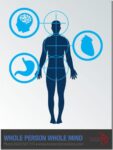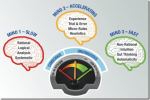One of the grand delusions of traditional safety is that learning is all in the brain. When you look at the ideology of traditional safety such as HOP, all the semiotics is brain-centric. Anyone with any expertise and intelligence in Education and Learning knows that human development is about … [Read more...] about Safety is Not All in the Brain
one brain three minds
Why Does 1B3M Matter in Safety?
Whether you can articulate it or not, your philosophy and ethic of the human matters for safety (https://safetyrisk.net/and-the-enemy-of-safety-is-humans/ ). If you view the human as an object, number or a hazard then brutalising persons becomes easy. This is what the AIHS endorses … [Read more...] about Why Does 1B3M Matter in Safety?
Evidence for One Brian Three Minds in SPoR
It is always good to be asked an open question of SPoR and these are always welcomed. The key to learning in risk and safety is reading and conversing outside the mono-disciplinary genre of risk and safety and by asking open questions. SPoR has no interest in closed questions of non-inquiry or … [Read more...] about Evidence for One Brian Three Minds in SPoR
A Change of Heart and Worldview
The connection between the Heart, Gut and Brain is astounding, which is why in SPoR, we make the concept of One Brain Three Minds (1B3M) (https://safetyrisk.net/gab-and-robone-brain-three-minds/) foundational to understanding decision making. The research on humans as enactive embodied persons is … [Read more...] about A Change of Heart and Worldview
There is no Fast and Slow Thinking, Nor Quick Learning
The founding weakness with Kahneman’s model of Minds 1 and 2 is there is no immediate developing mind. In fallible human learning there is no quick and slow, most learning is developmental. More so, Kahneman’s model is brain-centric and this is not how we learn or think. This is no surprise emerging … [Read more...] about There is no Fast and Slow Thinking, Nor Quick Learning
The Brain as Computer Myth
It is so attractive to develop simple binary models of human ‘being’ that are mythical/symbolic but NOT real. Eg. Human thinking is not fast and/or slow (https://safetyrisk.net/the-myth-of-fast-and-slow/). The implications of myth implies that people act on it. We witness this in any form of … [Read more...] about The Brain as Computer Myth
Triarachic Thinking in SPoR
One of the foundations of methodology in SPoR is triarchic thinking. Triarachic thinking understands the social world (Socialitie) in dialectic (dialogue). That is, there is something happening in the space between you and me, I and it, us and them. This is best represented by using a hyphen eg. … [Read more...] about Triarachic Thinking in SPoR
Wellness, Mindfulness and Resiliencing in Psychological Safety
‘mindfulness’ is one of those expressions interpreted a dozen ways, particularly if one is fixated on brain-centrism. However, the essence of Mindfulness is really about ‘person-ness’ not head-centredness. In Sociopsychological thinking we capitalise Mind to denote whole person. Too often the word … [Read more...] about Wellness, Mindfulness and Resiliencing in Psychological Safety
The Myth of Fast and Slow Thinking
I was reading a book on numerics and statistics this morning and the author quoted Kahneman (as fact) as if humans make decisions in two speeds. According to Kahneman’s binary ‘theory’ humans only make decisions at two speeds – slow/rational/analytical and fast/automatic. This is a myth, there is … [Read more...] about The Myth of Fast and Slow Thinking
Implicit Knowledge and Safety
Implicit Knowledge and Safety Most human judgment and decision making is implicit (tacit). What Polanyi described as knowledge that was felt but couldn’t be described. His famous phrase is: ‘we know more than we can say’. You can read Polanyi here: … [Read more...] about Implicit Knowledge and Safety









